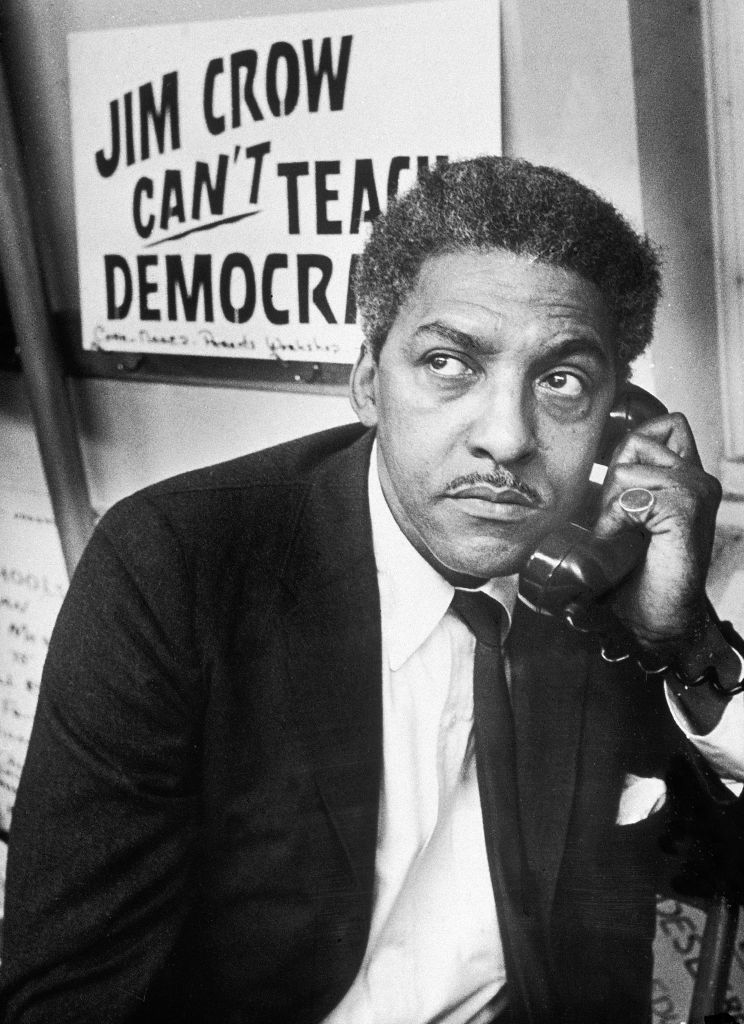A new film called Rustin aims to finally give long overdue recognition to the monumental yet overlooked civil rights leader Bayard Rustin. Directed by George C. Wolfe and starring Colman Domingo, the biopic details Rustin’s brilliant orchestration of the historic 1963 March on Washington.
 Domingo’s performance already generated Oscar buzz for capturing Rustin’s dynamism and charisma. Reviewers widely praise Domingo, though some critique the film for simplifying Rustin’s complex story. Nevertheless, Rustin provides a crucial spotlight on this marginalized civil rights hero, introducing his pivotal impact on American history to a new generation.
Domingo’s performance already generated Oscar buzz for capturing Rustin’s dynamism and charisma. Reviewers widely praise Domingo, though some critique the film for simplifying Rustin’s complex story. Nevertheless, Rustin provides a crucial spotlight on this marginalized civil rights hero, introducing his pivotal impact on American history to a new generation.
Bayard Rustin masterfully organized the 1963 protest march in Washington D.C., which culminated in Dr. Martin Luther King Jr.’s iconic “I Have a Dream” speech. Yet Bayard Rustin intentionally remained behind the scenes, his groundbreaking contributions obscured. As an openly gay Black man, Bayard Rustin faced discrimination even from civil rights allies in the 1960s.
But understanding the full legacy of the civil rights movement requires recognizing leaders like Bayard Rustin who shaped it significantly from the margins. Beyond Bayard Rustin’s brilliant organizing, he pushed the movement to adopt economic justice as central to its mission. His vision and leadership still inspire civil rights activism today.
Bayard Rustin’s Early Life and Activism
 To appreciate the abiding impact of leaders like Rustin, context on their early lives and motivations is key. Rustin was born in West Chester, Pennsylvania in 1912 to a Quaker family, establishing his commitment to pacifism and activism from childhood.
To appreciate the abiding impact of leaders like Rustin, context on their early lives and motivations is key. Rustin was born in West Chester, Pennsylvania in 1912 to a Quaker family, establishing his commitment to pacifism and activism from childhood.
Rustin’s conscientious objection to war led him to serve prison time rather than contribute to World War II efforts. He honed his talents as an organizer by leading youth marches and prayer protests in the 1950s. A prayer pilgrimage Rustin organized in Washington D.C. first catapulted Dr. King as a national civil rights leader.
Rustin’s brilliant community organizing laid the groundwork for King’s success. But as an openly gay man, Rustin faced barriers even among civil rights circles. Some leaders intentionally obscured his contributions to avoid association with his identity.
Despite discrimination, Rustin embraced his sexuality unapologetically. His unwavering conviction inspires an LGBTQ+ pioneer committed to activism with integrity.
Mastermind of the March on Washington
By 1963, energy in the civil rights movement had stalled. Protests in Albany, Georgia sputtered out without impact and the Kennedy administration remained unresponsive. Rustin recognized the need for a bold, unified demonstration of Black strength and solidarity on the national stage.
When tasked with organizing a March on Washington, Rustin dove in with vigorous focus. He planned a protest march from the Washington Monument to the Lincoln Memorial with strategic simplicity. His vision mobilized Americans of all backgrounds to come together and peacefully demand reform.
Rustin’s true organizing brilliance was his talent for uniting coalitions and multiplying the protest’s influence. Major civil rights, religious, and labor groups all collaborated under Rustin’s firm guiding vision. This diversity of allies expanded the demonstration’s significance.
On August 28, 1963, over 250,000 protesters converged on the National Mall. The protest culminated with Dr. King’s seminal “I Have a Dream” speech at the Lincoln Memorial. Rustin orchestrated a watershed moment for civil rights, harnessing the power of united citizens to resonate to the halls of power and catalyze reform.
An Unsung Hero Finally Recognized
Despite Rustin’s pivotal impact, he faded into obscurity for decades following the March on Washington. But he remained committed to empowering others through steadfast activism behind the scenes.
In 2013, President Obama finally recognized Rustin’s contributions with a posthumous Presidential Medal of Freedom. And now the film Rustin is working to carry on that legacy by enlightening a new generation about this overlooked hero.
 Rustin understood that ordinary citizens unified in moral clarity can sway the trajectory of justice, even at the highest levels of power. His vision of dignified, collective activism continues to inspire modern civil rights movements.
Rustin understood that ordinary citizens unified in moral clarity can sway the trajectory of justice, even at the highest levels of power. His vision of dignified, collective activism continues to inspire modern civil rights movements.
Though denied public credit in his own time, Rustin’s legacy now burns bright. He paved the way for leaders like Dr. King while still embracing his marginalized identity. Rustin’s tireless fight for justice and dignity for all cemented his place as an unsung civil rights hero whose impact continues reverberating through the ongoing march toward progress.












Comments 1